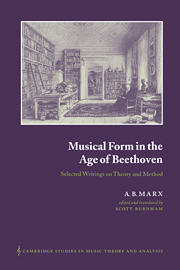Book contents
5 - Ludwig van Beethoven: Life and Works: selected excerpts
Published online by Cambridge University Press: 03 December 2009
Summary
The following excerpts, from Marx's life-and-works biography of Beethoven, first published in 1859, demonstrate above all the central importance of the “Eroica” Symphony within Marx's musical thought. It was this work that enjoined Marx to declare a new era in music, one that “cannot be superseded.”
Marx devotes three chapters to the “Eroica” in his Beethoven biography. The first of these, “The consecration of the hero,” presents Marx's programmatic analysis of the “Eroica.” The overriding point of Marx's analysis is to show how Beethoven's music is capable of embodying an Idea. For Marx, the first movement represents an Ideal image of Napoleon's heroic life, summed up in Marx's terse formulation: “Napoleon was battle.” The ensuing dramatic program thus charts the course of an idealized battle, from the morning on the battlefield to the celebration of victory. Marx's analysis manifests the usual bias toward first movements; in this case, his analysis of the first movement is at least three times longer than that of the rest of the movements combined.
In the second chapter, “The “Eroica” Symphony and ideal music,” Marx outlines three stages of music history, in order to place Beethoven and his “Eroica” Symphony at the culmination of that history. Marx's triadic view of music history tracks the evolving role of musical art in human affairs: the first stage is that of the blessed play [Spielseligkeit] of tones, the second that of the representation of feelings, the third that of ideal music.
- Type
- Chapter
- Information
- Musical Form in the Age of BeethovenSelected Writings on Theory and Method, pp. 157 - 188Publisher: Cambridge University PressPrint publication year: 1997
- 1
- Cited by



